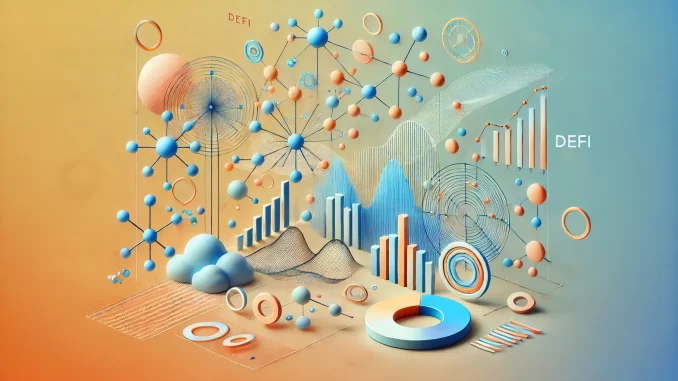
Initially, the fundamental principles of global finance are beginning to be shaken.
For centuries, traditional finance (TradFi) has relied on intermediaries—banks, brokers, and regulators—to facilitate trust, regulate the flow of money, and extract fees. The emergence of a radical new paradigm, **decentralized finance (DeFi)**, is a direct result of the significant increase in blockchain-based technologies.
Is this the conclusion of conventional finance as we currently understand it? Not entirely. Nevertheless, the future is being rewritten one protocol at a time, block by block.
In this post, we offer a forecast of the potential emergence of a **decentralized economic future** and the potential for it to substantially impact the global financial system.
📉 The Progressive Decline of TradFi’s Monopoly
Despite the fact that banks continue to dominate global finance, their influence is waning:
* Traditional systems are characterized by high fees, sluggish settlements, and limited transparency. Millions of individuals, particularly in the Global South, are **unbanked or underbanked**.
* Centralized institutions frequently fail to provide adequate services to the average citizen during economic crises (2008, 2020, 2023). The demand for alternatives is being stimulated by the growing skepticism toward centralized authorities and fiat currencies.
In contrast, **DeFi** offers permissionless, programmable, and transparent access to financial tools at any time and in any location.
The Emergence of the Decentralized Economy
Technologies such as: are facilitating the development of decentralized economies.
* **Smart contracts** (automated agreements without intermediaries) * **Stablecoins** (digital dollars without banks) * **DAOs** (Decentralized Autonomous Organizations for governance) * **Tokenized assets** (from real estate to carbon credits) * **Self-sovereign identity and on-chain reputation systems**
The combination of these instruments enables the operation of complete financial ecosystems **without centralized control**.
🔮 Future Prediction: What Is Next?
1. **DeFi Defaults in Emerging Markets**
DeFi offers a lifeline to nations that are experiencing inflation, currency controls, or insufficient banking infrastructure. Expect a substantial increase in the adoption of this technology in regions such as:
* **Argentina, Venezuela, Nigeria**: For inflation hedging and stablecoin remittances. * **Kenya, Philippines**: For play-to-earn income, mobile lending, and yield generation.
* **Ukraine, Turkey**: As secure havens during periods of conflict or currency collapse.
These regions may entirely abandon traditional banking, similar to the manner in which they abandoned landlines in favor of mobile devices.
2. **Traditional Banks Transition to “On-Chain”**
It is likely that the following measures will be implemented by banks and financial institutions in order to maintain their relevance:
* The issuance of **tokenized versions of bonds, loans, and deposits**. * The provision of **custodial wallets** and staking services.
* Integrating with **DeFi protocols** to offer liquidity and yield options.
Consider it as **TradFi enclosed in a Web3 skin**—familiar institutions operating on unfamiliar rails.
3. **Blockchain-Based Economies Are Established by Nation-States**
As a result of the proliferation of **CBDCs (Central Bank Digital Currencies)** and sovereign stablecoins, the following is expected:
* State-run DeFi platforms for domestic finance and welfare distribution. * Cross-border CBDC payments that bypass SWIFT or USD intermediaries. Social benefits and digital identity are linked to blockchain-based credentials.
Decentralization will not be restricted to the private sector; it will become a **national infrastructure trend**.
4. Decentralized autonomous organizations (DAOs) replace corporations in critical sectors.
**Organizations that are governed by protocols** will emerge for the following reasons:
* Investment (e.g., decentralized VC funds)
* Insurance (smart contracts regulate collective risk) * Community-owned revenue sharing for media, entertainment, and content platforms
In numerous cases, these organizations will surpass traditional organizations in terms of user alignment, efficiency, and transparency.
Obstacles to the Decentralized Future
Despite the momentum, challenges continue to exist:
* **Scalability and UI/UX**: DeFi must be as user-friendly as mobile banking applications.
********* **Security risks**: Smart contract defects and exploits continue to erode trust.
* **Regulatory friction**: Governments may be hesitant to relinquish control over money and markets.
* **Fragmentation**: Competing protocols and standards may cause confusion for users and developers.
However, innovation frequently surpasses resistance, particularly when demand is imperative, global, and digitally native.
🌍 The Ambition of a Completely Decentralized Economy
Can you imagine a future, perhaps in 2040, in which:
* Smart contracts are implemented to compensate employees with stablecoins. * Your credit score is replaced by an on-chain reputation insignia.
* Retirement funds are invested in DAOs rather than mutual funds.
* Public commodities, including renewable energy and infrastructure, are funded through tokenized, community-governed treasuries. Citizens utilize digital accounts that are linked to proof-of-residency NFTs in order to vote on local policies.
This is not a work of science fiction. It is the natural consequence of **finance without friction, control without centralization, and coordination without borders**.
Final Thought: Evolution or Termination?
Consequently, is it the **demise of conventional finance**?
Not entirely. The definition of “traditional” is, however, undergoing a swift evolution.
We are currently witnessing the emergence of a **parallel financial system**, which has the potential to:
* Either completely replace them in regions and sectors where they have failed, or integrate them with legacy structures to establish a hybrid model (CeDeFi).
The forthcoming decade will determine TradFi’s capacity to either adapt or become obsolete. The **decentralized economy** is no longer a peripheral endeavor; it is a force that is influencing the future of global finance. This is a certainty.
***In your view, will traditional finance survive, undergo a transformation, or ultimately fail? Let us engage in a dialogue below. **
Leave a Reply